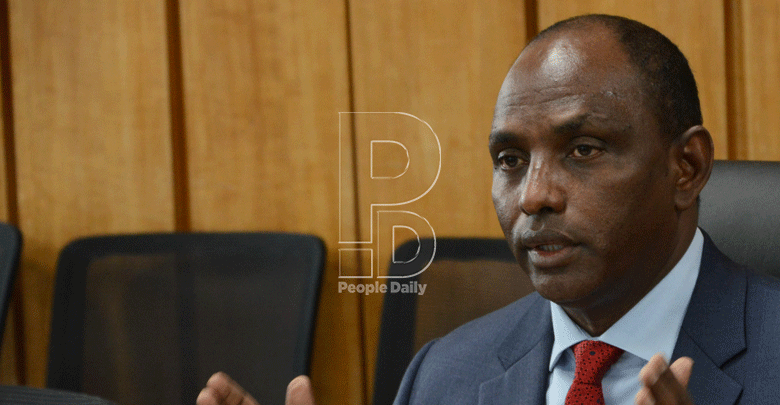‘Broke’ Treasury changes funds disbursement mode

Lewis Njoka and Anthony Mwangi
Fear and anxiety have gripped government parastatals after the National Treasury changed the mode of funds disbursement from quarterly basis to monthly.
Economic and governance experts claim the new system could be an indication of the cash-crunch facing the government as a result of economic downturn.
Effective September 1, the government will change the mode of disbursing monies to Semi-Autonomous Government Agencies (SAGAs) in a move it says is aimed at streamlining cash flow planning and minimising the amounts of idle cash held by the agencies.
Treasury has advised SAGAs that depend on the exchequer for their operations to be requesting for recurrent expenditure disbursements on a monthly basis as opposed quarterly.
Similarly, disbursement requests for development budget will now be disbursed based on an entity-producing project completion certificates.
Speaking to People Daily, Treasury Cabinet Secretary Ukur Yatani said the move was only aimed at streamlining the operations of the agencies and had nothing do with economic hardships.
“This is an administrative measure aimed at streamlining cashflow planning to minimise idle cash held by the entities and also to ensure timely release of the funds to the entities. It has nothing to do with the economic crunch,” said Yatani.
From hand to mouth
However, experts are divided on the matter with some saying the move could cripple the operations of SAGAs while others say the move was long overdue.
Kikuyu MP Kimani Ichungw’ah, who is the immediate former chairman of the Budget and Appropriations committee, says the changes effected by the Treasury was not good for the country.
“The monthly disbursements are a clear indication that we are living from hand to mouth.
There are no enough resources to fund ministries for a quarter but only on monthly basis,” said Ichung’wah.
But Kitui Central MP Makali Mulu, a member of the Budget Committee, termed it a good indication the Kenya Revenue Authority (KRA) collections had improved.
“These are good signs of an improved economy, now the National Treasury can afford to release money to ministries in quarterly basis as opposed to quarterly,” said Mulu.
A head of parastatal, who spoke to People Daily on condition of anonymity, however, said the move by Treasury was in response to a cash crunch in the government, warning that implementing it would present a logistical nightmare to Treasury due to the large amount of record keeping involved.
He said SAGAs make financial commitments based on the budgetary allocations approved by Parliament hence monthly requests for disbursement will make it difficult for them to plan.
He denied claims some government agencies hoard cash, saying procurement processes are too cumbersome which makes the spending process slow.
“The government must be broke to adopt that kind of disbursement. They must be in dire straits. Do they have the capacity to process all these requests on a monthly basis?” he asked.
“They should rethink that method. Otherwise it is going to put parastatals in a lot of logistical and planning nightmare,” he added.
Noting that the current disbursements are hardly on time, he said the best approach would be to trust the agencies and disburse amounts approved by parliament on a quarterly basis while at the same time ensuring the money is spent as per approved plans.
Delayed disbursement
Treasury has faced frequent backlash over delayed disbursement of funds to counties.
As of June for instance, Treasury was yet to disburse monies that were due in April amounting to over Sh50 billion.
Samuel Nyandemo, a senior economics lecturer at the University of Nairobi, says while the move by Treasury would help instill fiscal hygiene, it was necessitated by a cash crunch in Treasury and not the need to streamline cashflow planning as stated by the exchequer.
He said the new directive could delay the disbursement of money to some SAGAs resulting in delays in the implementation of some programmes.
“The government is not telling the public one thing, right now it is very broke. It is financing it is programs from hand to mouth.
This is a survival tactic given the fact that the government right now is on the red,” he said.
Wangari Muikia, an economic consultant, lauded the move terming it a step in the right direction.
She said it will give some give more control to Treasury and instill fiscal responsibility in the SAGAs as they will no longer receive cash for development unless that have achieved certain milestones.
She noted that it made no sense for the government to borrow money only for the SAGAS to invest the same in government bonds for profit.
“Historically, it has been very challenging to track the expenditure of Semi-Autonomous Government agencies. They are not required to provide detailed financial statements to Treasury. Treasury just gives them lumpsum transfers,” Muikia said.
“I think it makes sense as it goes towards accountability, value for money and making sure that money is used in a prudent fashion,” she added.
Muikia’s views were echoed by Nikhil Hira, a director at Bowmans Capital who lauded the move saying it would ensure that government sends development money only for projects that actually exist.
“It doesn’t make sense to send them money for projects that are not happening effectively.
We have a lot of projects that we say are happening but nothing is happening at all. If nothing is happening why should we be paying for it?” he said.
Being cash strapped, the move would reduce the amount of money lying idle within the agencies and improve cash flow for the government.








